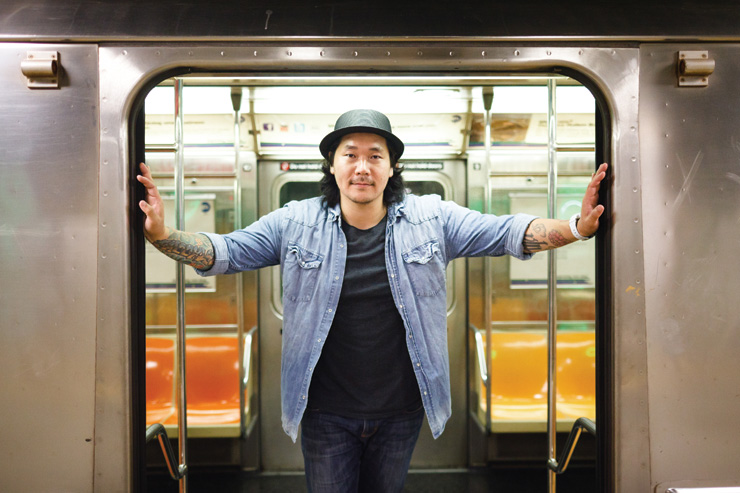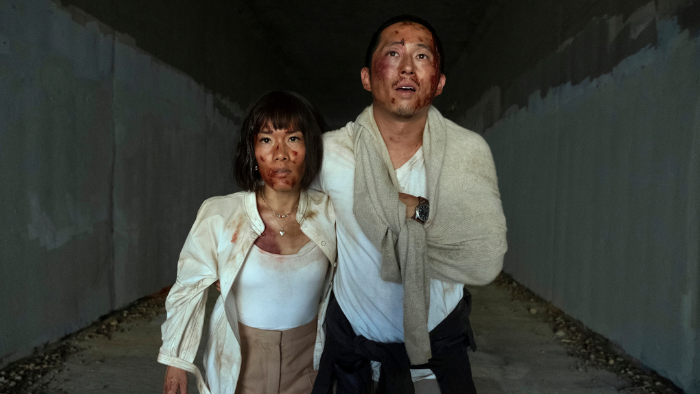Pastor Gage Jung, founder of Hipster Church in Queens, New York, is reimagining worship to make it exciting and relevant for a new generation.
story by David “Rek” Lee
photographs by Minnow Park
Gage Jung is a victim of cyber-bullying.
He tells me about it between bites of Margherita slices at South Brooklyn Pizza, his tattooed forearms on display as he reaches for napkins. When he gets up to grab a Coke, he stands over 6 feet tall. He doesn’t strike me as the victim type.
But ever since his church was featured in the New York Daily News, he’s become the target of anonymous hate mail. His critics question his focus on Flushing, an area in Queens where churches sit elbow to elbow, and Hipster Church, the arresting label he chooses to call his movement. Mean-spirited as they are, their concerns are understandable even by his own admission. So it’s a discussion he’s willing to have, if only they would listen.
I tried to attend the monthly service, twice, once at the Queens Crossing mall in the heart of Flushing and, a second time, at the summer-appropriate Flushing Meadows Park, next to Citi Field baseball stadium; both plans were thwarted by miscommunication and bad weather. From what I read in theDaily News, it sounded like a good time: “Congregants use a Bible app on iPhones … participants listen to indie rockers like MGMT and Arcade Fire and chat over donuts.” It might sound contrived to some, but the forward-thinkingness doesn’t end with snacks and tech savviness.
Jung is rethinking worship by using slightly modified secular songs and even incorporating raps into praise. He’s challenging the established model of regurgitating sermons throughout the day with plans to dedicate whole services to non-believers. Think less eternal damnation talk and more of a Q-and-A approach.
“People need to feel like they can express themselves without being judged,” he explains. “That’s a challenging environment, but it can be done.”
Lastly, in a move that is sure to attract the Sunday narcoleptics, he takes a cue from TED Talks, the popular forum for sharing inspirational presentations from the Technology, Entertainment and Design conference, and forces himself to keep his sermons under 20 minutes. “They only give 18 minutes to their speakers to influence and change the crowd. I thought, ‘I’m a Christian, why do I get so much time to talk?’” he says, visibly amused at the thought.
But the non-traditionalist isn’t breaking rules just to break them. Jung attended Fuller Theological Seminary in Pasadena, Calif., and is an ordained pastor from the Assemblies of God, an international association of Pentecostal churches. To establish a good foundation for his church, he’s been taking a church-planting course with Tim Keller’s Redeemer Presbyterian Church, renowned in Christian circles in New York, for the last two years. He also cites Mosaic Church’s Erwin McManus as a huge influence.
“The church used to be the epicenter of awesome art,” says Jung, who had about 70 people at his last standing-room-only service. “[McManus] says we have to bring that back. It needs to be creative, exciting and relevant.”
But the bits of wisdom that resonate most with Jung come from his own minister father. “He said if relevancy is at the cost of truth, you whack,” says the pastor, in a loose translation of his father’s words. “He understands that Hipster Church is a church that is desperately trying to contextualize the Gospel for its time and environment. He doesn’t care about how the packaging is as long as the core is Jesus.”
We take a break to consume a second round of pizza slices that owner Jim McGown, and friend to Jung, brings to our table free of charge. When Jung mentions his father also doing ministry, it reminds me of a friend of mine who’s taking over his family’s successful retail business that his immigrant father started. But in this digital era, my friend sees new ways to take the brand to the next level through social media integration, brand collaborations and participating in the online dialogue on reaching untapped markets.
Jung wants to try something similar.
“We have big plans,” he says. “My brokers have been looking all over Flushing, all types of buildings and warehouses. Our vision is to have our sanctuary feel like a VH1 Unplugged studio. We’re going to have guest bands and speakers—they’ll come once a month—and we’re going to film the whole thing.” Jung also mentions creating video content accessible through paid memberships and holding auditions to sign musical acts to a Hipster Church record label.
“It’s not for everybody, but for some individuals it makes perfect sense,” he says. “Why can’t a church benefit from their sincere desire to see people live out their full potential?” It’s a modified version of a relatively new concept called Business as Mission (BAM for short), for churches that want to fund evangelical efforts without dependence on tithes.
Jung and his family moved to the States when he was 3. They lived in Virginia for one year before finally settling down in Brooklyn. As the only Korean kids in the neighborhood, he and his brother got beat up often. “I remember when I was 12, a big white guy just came up and said, ‘You chink,’ and punched me in the face for no reason,” Jung recalls. His parents also worked late at the church, so that meant a lot of ramen-and-Spam dinners and late nights soaking up the glow from the TV.
Still, Jung never resented the church for his parents’ divided attention. If anything, his upbringing left him open to influences atypical to the average pastor. “My environment created a thrift for expression through hip-hop, but my real influence was Jesus,” he says. The two worlds co-existed in Jung’s life, and he doesn’t shy away from speaking openly about how things could have turned out very differently for him.
“I tried to be a rapper, dude. Me and my band performed at CBGB’s [a legendary New York City venue], before it closed down. [That was] one of the highlights of my life. I had my own studio, and I was really into the music thing. I had a beat I made with my friend Sam, and Busta Rhymes wanted to buy it,” he says.
At the same time, he was dedicated to ministry, serving at Young Nak Presbyterian Church in Los Angeles, and later, the English ministry at his parents’ United Generations Church in Brooklyn. But it wasn’t until his mother was diagnosed with stage 4 cancer—she had a seven-inch tumor in her spine—that he says he received his calling.
“My dad had to retire, and the [church] board voted me in [to replace him], but they didn’t like me,” says Jung. “I was too young, and they wanted me to wear a suit and tie.” It’s hard to imagine him in formal attire as he is currently sitting comfortably in his black tank top and loose-fitting denim shirt, his hair untamed. But the differences run deeper than mere clothes.
“I always had this missional agenda and desire to get more and more people exposed to the Gospel of Jesus Christ … I was fighting an internal battle with Christians that didn’t get the concept that we, the Christians, were birthed for the agenda of helping other people to become Christian,” he says.
After six months, Jung’s mother beat cancer in what he says her doctors called “a miracle,” and his dad returned to his church post, putting the board at ease.
Now Jung was left with a new burden. For two-and-a-half years (including his service as a youth pastor), he had served a congregation that never quite understood him. So, even though he grew up in this church, he knew others considered him a misfit, and that there were those out there who felt the same way as he.
And, with that, Jung set forth on his own path. It was bigger than hip-hop.
“Basically, I’m trying to build a church I would want to go [to],” he says earnestly.
There are many reasons for picking Flushing as the base site for Hipster Church. He hopes to offer an alternative to “Korean kids falling away from God because they don’t see the relevance in it.” Alluding to the large population of Korean and Chinese in the area, the mission-minded pastor also added rhetorically, “Where would you go if you wanted to train the next generation of missionaries to go to China?”
But sometimes, a mission becomes less about what you set out to do and more about why you decide to stay.
“There was this big muscular black guy, Timberland boot kind of guy, you don’t wanna mess with. When I did the altar call after I preached, he came up to the front, and he was bawling, dude,” recalls Jung. “I was trying to tell him to do the sinner’s prayer, but he couldn’t do it because he was so choked up.
“Later on, after service, he told me his whole life he had been doing drugs, and he just felt something calling to him, nudging him spiritually. He accepted Jesus Christ and said he wouldn’t do that drug stuff anymore. I know that being there, it’s justified. It’s important.”
This article appeared in the October 2011 issue of KoreAm. Subscribe today!






